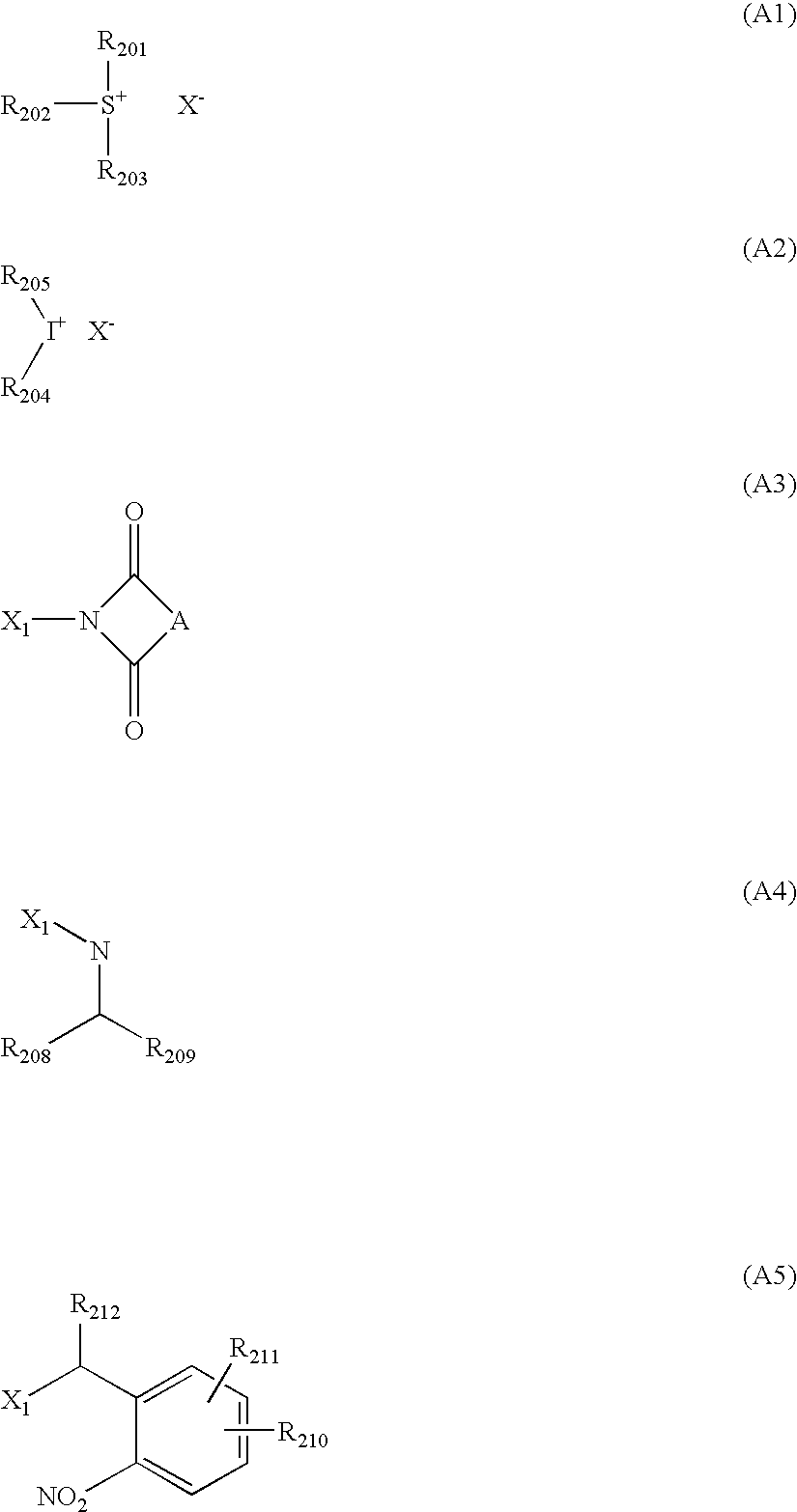Photosensitive composition, compound for use in the photosensitive composition, and pattern forming method using the photosensitive composition
- Summary
- Abstract
- Description
- Claims
- Application Information
AI Technical Summary
Benefits of technology
Problems solved by technology
Method used
Image
Examples
synthesis example 4
Synthesis of Compound (A-69)
[0545] A BF4 salt of Compound (A-69) (5.02 g (8.72 mmol)) and 4.0 g (9.16 mmol) of 4-dodecyloxy-2,3,5,6-tetrafluoro-benzenesulfonic acid were dissolved in a mixed solvent of acetonitrile (100 mL) and water (100 mL) and stirred at room temperature for 2 hours. The resulting solution was concentrated and after adding chloroform (200 mL), washed three times with water (200 mL). After removing the solvent, the residue was purified by column chromatography (SiO2, ethyl acetate / methanol=9 / 1) to obtain the objective solid (6.22 g, 78%).
[0546]1H-NMR (300 MHz, CDCl3) δ: 0.880 (t, 9H), 1.254 (bs, 48H), 1.436 (m, 6H), 1.773 (m, 2H), 1.878 (m, 4H), 3.621 (m, 2H), 3.798 (m, 2H), 4.190 (t, 2H), 5.702 (s, 2H), 7.505 (m, 2H), 7.782 (m, 1H), 8.125 (m, 2H).
[0547]19F-NMR (300 MHz, CDCl3) δ: −139.13 (m, 2F), −156.03 (m, 2F).
synthesis example 5
Synthesis of Compound (A-83)
[0548] A BF4 salt of Compound (A-83) (1.5 g (4.36 mmol)) and 2.0 g (4.58 mmol) of 4-dodecyloxy-2,3,5,6-tetrafluoro-benzenesulfonic acid were dissolved in a mixed solvent of acetonitrile (100 mL) and water (50 mL) and stirred at room temperature for 2 hours. The resulting solution was concentrated and after adding chloroform (200 mL), washed three times with water (200 mL). Then, the solvent was removed to obtain the objective solid (2.21 g, 75%).
[0549]1H-NMR (300 MHz, (CD3)2SO) δ: 0.851 (t, 3H), 1.242 (bs, 16H), 1.434 (m, 2H), 1.777 (m, 2H), 2.000 (s, 6H), 2.182 (m, 4H), 3.616 (m, 4H), 3.886 (s, 3H), 4.208 (t, 2H), 7.110 (d, 2H), 8.110 (d, 2H)
[0550]19F-NMR (300 MHz, (CD3)2SO) δ: −140.05 (m, 2F), −156.08 (m, 2F).
synthesis example 6
Synthesis of Compound (A-53)
[0551] A Br salt of Compound (A-53) (1.25 g (4.36 mmol)) and 2.0 g (4.58 mmol) of 4-dodecyloxy-2,3,5,6-tetrafluoro-benzenesulfonic acid were dissolved in a mixed solvent of acetonitrile (100 mL) and water (50 mL) and stirred at room temperature for 2 hours. The resulting solution was concentrated and after adding chloroform (200 mL), washed three times with water (200 mL). Then, the solvent was removed and the resulting solid was washed with diisopropyl ether and vacuum-dried to obtain the objective solid (2.43 g, 90%).
[0552]1H-NMR (300 MHz, (CD3)2SO) δ: 0.857 (t, 3H), 1.266 (bs, 16H), 1.433 (m, 2H), 1.777 (m, 2H), 2.211 (m, 4H), 3.511 (m, 4H), 4.213 (t, 2H), 5.225 (s, 2H), 7.624 (m, 2H), 7.755 (m, 2H), 7.996 (m, 1H), 3.521 (m, 4H), 4.210 (t, 2H), 5.430 (s, 2H), 6.833 (d, 2H), 7.774 (d, 2H), 9.483 (s, 1H)
[0553]19F-NMR (300 MHz, (CD3)2SO) δ: −140.11 (m, 2F), −156.00 (m, 2F).
PUM
| Property | Measurement | Unit |
|---|---|---|
| Solubility (mass) | aaaaa | aaaaa |
| Molecular weight | aaaaa | aaaaa |
| Photosensitivity | aaaaa | aaaaa |
Abstract
Description
Claims
Application Information
 Login to View More
Login to View More - R&D
- Intellectual Property
- Life Sciences
- Materials
- Tech Scout
- Unparalleled Data Quality
- Higher Quality Content
- 60% Fewer Hallucinations
Browse by: Latest US Patents, China's latest patents, Technical Efficacy Thesaurus, Application Domain, Technology Topic, Popular Technical Reports.
© 2025 PatSnap. All rights reserved.Legal|Privacy policy|Modern Slavery Act Transparency Statement|Sitemap|About US| Contact US: help@patsnap.com



